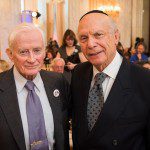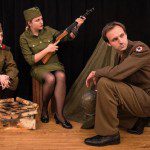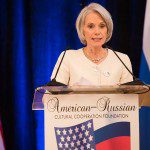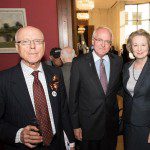70 Years on, Spirit of the Elbe Evoked at Russian Embassy
By • June 11, 2015 0 2242
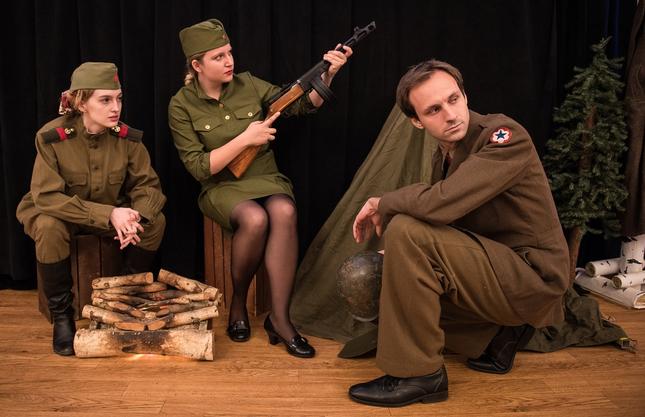
In Washington, D.C., it sometimes seems that every day is a commemoration of some other day, some other time. It’s natural that we do this is in this city. For the country and for the people who live here, this city is a kind of hallowed and symbolic ground in its name, its statuary, its function, its cemeteries and its governmental business of being the pragmatic soul of what we believe and how we present ourselves to the world and to ourselves.
It is also home to most of the world’s embassies who presented themselves formally and culturally to this city on a daily basis, and also in memory. That makes Washington a unique place—among us scattered across the city, including Georgetown, are the envoys and functionaries of long-time friends, sometime adversaries, and former enemies, who also have moments and events to commemorate from their histories, events in which they were sometimes co-joined with the United States cooperation and triumph.
Memory—and a desire in difficult times to have things be something other than what they are—serves as a kind of engine on these occasions. So it was—after the city, and London and Paris, celebrated the 70th Anniversary of Victory-in-Europe Day—or V-E Day—that it came to pass that the American-Russian Cultural Cooperation Foundation and the Embassy of the Russian Federation presided over “Unforgettable Years, 1941-1945,” billed as a “Salute of Arts and Culture to the 70th Anniversary of the Allied Victory in Europe” last week.
Which meant that hundreds of invited guests gathered at the Embassy of Russian Federation in an event—reception, dinner, exhibits, vodka, food, speeches, World War II patriotic posters throughout the embassy and music and stories told as if around a rather splendid campfire—stirring memories recalled of suffering, war and harrowing times in the Russian theater of World War II.
If the atmospheric setting—some members of the embassy staff were dressed in the uniforms of WWII Soviet Union soldiers—suggested a commemoration of the Russian experience of the war, the theme and focus of the event, echoed both by speakers and the performers, seemed more to focus on a singular aspect of that war—the spirit of assistance, and cooperation that existed among Americans and Russians in their combined efforts to finally defeat Nazi Germany’s war machine.
In particular, the night’s events returned again and again to a singular and triumphant event, when American and Russian troops hooked up at the Elbe River on April 25, 1945, in a joyous, sometimes inchoate meeting of troops, officers and men, tanks and jeeps, marking the military end of Nazi Germany. It was in many remembered ways, the high-water mark of American and Russian cooperation, time and again referenced by speakers and performances throughout the evening.
It was noted often that Russian soldiers and civilians suffered inordinately during the course of the war. “Russia deaths totaled 27 million, or roughly 19,000 deaths a day during the course of the war,” said Sergey Kislyak, the congenial ambassador of the Federation of Russia in his welcoming speech. But this was not to be an event only about the suffering of Mother Russia. “On this day, we also remember our comrades in arms abroad . . . today we are gathered to remember this important convergence of American and Russian history,” said Kislyak, as he noted that Arlington National Cemetery includes a memorial to the meeting at the Elbe. “We hope that the spirit of the Elbe descends on us.”
This was the kind of celebratory, moving and wishful night in which the reality of history, past and current, took a back seat in a vintage WWII jeep with no mention of the Cold War that commenced fairly soon after the Nazis surrendered in Europe. There was no mention of missiles and arms races, Cuba and Afghanistan, or the tensions that continue over the crisis in the Ukraine. It seemed that everyone and all wanted to resurrect a singular moment in time, willing it back to life.
This tends to happen when people—many of them quite prominent—get together in the spirit of a singular, jointly and hard-gained triumph, when soldiers clutched each other in mutual honor of the suffering and courage they all contributed.
We heard from veteran diplomat John R. Beyrle, who told the remarkable story of his father, Joseph Beyrle, a paratrooper from Michigan who jumped behind the lines in advance of D-Day, was captured, escaped in Poland and met a Russian tank unit—commanded by a female soldier—with whom he fought for a time on the Eastern front until being badly wounded and returned to the U.S.
Rabbi Arthur Schneier, founder and president of the Appeal of Conscience Foundation, walking slowly to the podium, told how he was freed from Auschwitz by Russian troops. “Believe me, I was a lot thinner then,” he said. “No one believed such things could happen. We cannot ever forget—none of it.”
Susan Eisenhower, the granddaughter of President Dwight Eisenhower who commanded the western Allies’ invasion of Hitler’s Fortress Europe, spoke of her grandfather’s belief in the importance of the “imperatives of peace.”
In a buoyant performance, former congressman James Symington, a tenor, and Anton Fedyashin, a baritone, combined on singing the popular World War II song, “On a Wing and a Prayer,” in English and Russian.
Russian Pianist Yuri Shadrin played Sergei Rachmaninoff stirring “Prelude in G Minor.” A group of performers evoked the period with the moving “The White Cliffs of Dover,” sung by Embassy Series founder and director Jerome Barry. It was all part of a musical program of music popular in the Soviet Union and the United States during the war.
Throughout the evening, several Russian veterans of World War II mingled, shook hands and were honored by the guests. They came from another time . . . on a place . . . on a river . . . in Europe.
- World War II Soviet soldier impersonators share a traditional soldier’s meal of buckwheat and vodka. | Photo by Kevin Allen

